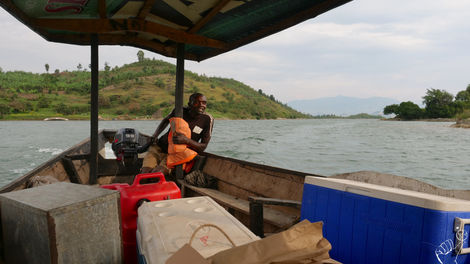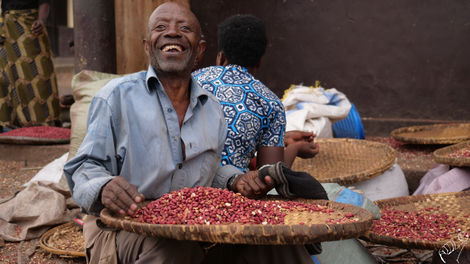top of page

THE WORLD BY THUMB
100% hitchhiking - 100% world tour - Since 2013 - By Florence Renault
RWANDA
From September, 24th to October, 5th, 2019
Travel Story
After three hours waiting at the border between Uganda and Rwanda, a car finally gave us a ride us to the capital. Few cars drive on this fresly paved road. The overloaded bike seems to be the most popular option. We zigzag between the green hills, along the rice fields and then see thousands of lights. It is Kigali, very clean and organized, I had never seen that in six months in Africa! The downtown looks like a ghost district. Where are the screams? the traffic ? the pollution ? The curved streets stretch over several hills and the perspectives give a certain charm to the capital.
At the supermarket, the cashier wraps our shopping in a brown paper. Plastic bags are forbidden! Our couchsurfing host leaves a whole apartment at our disposal for two days. He is happy to speak French. The official language in school has changed to English and French is forgotten. The people under thirty years have not learned it and the people over thirty have forgotten it for lack of practice.
One evening, we have dinner with our host and a German traveller that we met in Uganda. She talks about the genocide museum, the people who died in the family of a friend ... The atmosphere feels akward, our host, an orphan of the genocide, keeps silent and starts to remove the plates of the restaurant table. She changes the subject and the next day I go to visit the museum alone because Sebastian considers that he already had his dose of horror with the museums of the genocide in Cambodia and in Vietnam.
I discover that the Rwandan genocide was not a tribal struggle but rather a class struggle between the Tutsis (owners of more than ten cows) and the Hutus majority. The ideology of hate has been largely relayed by priests and mass killings have been encouraged in churches! Since then, many Rwandans have abandoned religion or converted to Islam! I learn that the french government has financially supported the sale of French weapons in Rwanda. A report pleading for the dispatch of 500 peacekeepers to avoid the massacre has been ignored by the UN ! During the 1994 genocide, 800 000 people died and 500 000 others were raped (and infected with AIDS with purpose). It is the whole society that is traumatized. Every Rwandan suffers from deaths of realtives.
These distant stories heard as a child seem very close now.
This museum does not show shocking images, it explains the facts. I see some visitors with tears. Personally, I find that the testimonies are quite cold and do not go into details. Is it too recent to talk about it? Or do the reserve of Rwandans prevent to say more?
We leave Kigali with small backpacks to hitchhike to Lake Kivu.
It is one of the few lakes of the continent where you can swim without the risk of being attacked by a crocodile or a hippopotamus. This time, the road is really bad and our drivers never go far away ... until a Belgian expatriate stops. He explains that this is one of the few unpaved roads in the country and is surprised to see some Rwandans walking barefoot because it is forbidden by the president. He prefers not to speak about politic. This is a subject to avoid here, just like genocide.
He is going to spend the weekend on his small lot at the edge of the lake. Inaccessible by the road, he must go there with his boat. He offers to take us there because there is a shortcut to reach the Congo Nile Trail, the path that we will hike for four days. That's how we end up with a beer in the hand, hitchhiking his boat on Lake Kivu, with the swimming champion from Rwanda at the helm!
These four days of walking take us through clean and organized villages, with many bars and some cafes. Restaurants and grocery stores are rare or minimalists. We feed ourselves mainly on avocados, bread and bananas bought from the villagers. The houses are built of stone with the gray iron roofs ... It is more modern than the clay and lime houses of the previous countries! But water and electricity are not common. The toilets are in the garden and the women are cooking outside on the fire. Nobody speaks English (Don't they go to school?). Some words of French help to communicate.
The children go off to fetch water, wood or plantain bananas that they bring back to their heads. They waved their hands for a long time and howled "Muzungus, muzungus" (= white people). Which rushes to run more children. Some claim money and follow us for a long time. Considering their enthusiasm, the passage of "Muzungus" must be the main entertainment in these isolated villages. Wemeet only four more hikers in four days! In the evening, we swim in the fresh water of the lake and sleep in homestays. The evenings are cold, like the temperament of some Rwandans who do not respond to our smiles and our hello. Africa has accustomed us to a little more thermal and human warmth.
Our steps lead us to Gisenyi, the town at the border with the Democratic Republic of Congo. Gisenyi looks like big villages with houses far from each others. We walk in the cobblestone streets to look for wifi and write to our host of Kigali that we are coming back. The water is cut in all of Gisenyi, so as often, we heat water and shower with a bucket. At night, I see, on the other side of the border, teh light of the red lava at the top of Nyiragongo volcano.
Our last days in Kigali allow us to rest and work on my photos and videos.
We extend our stay to discover the nightlife of Thursday night ... But the street bars is almost empty, Kigali fell asleep. Sebastian leaves Kigali by bus and I continue my hitchhiking world tour alone. We will meet again in 1200 kilometers in Arusha, Tanzania.
Photographies Of Rwanda



bottom of page





















